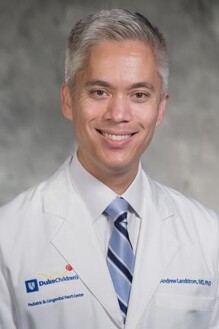Learning the Cause of a Loved One’s Sudden Death Can Protect You and Your Family
Genetic Heart Problems Are Often to Blame, Especially in Young and Seemingly Healthy People

When a relative -- especially a young one -- dies suddenly and without warning, learning the cause of death is important because it may help save the surviving family members. “Many of these sudden deaths are actually due to heart conditions caused by genetic factors, which means that other people in the family, even children, could be at risk,” said Duke electrophysiologist and pediatric cardiologist Andrew Landstrom, MD. Using comprehensive assessments and advanced genetic testing, Dr. Landstrom and his Duke colleagues help families learn why their loved one died and reduce the risk of another sudden death.
The Mystery of Sudden Death
Most people are familiar with sudden infant death syndrome or SIDS -- when a baby under the age of one dies suddenly and with no identifiable cause. When this happens to people older than one, it is called sudden unexplained death syndrome, or SUDS. Research shows that many of these deaths are caused by genetic arrhythmias, cardiac channelopathies (abnormal heart cells that cause heart rhythm disturbances), and cardiomyopathies (heart muscle diseases) that are almost impossible to identify with a standard autopsy.
A Post-Mortem Evaluation Can Give You Answers
Duke partners with the North Carolina Office of the Chief Medical Examiner (OCME) to offer post-mortem genetic testing -- also known as a molecular autopsy -- for NC residents who died within the last five years or so, were less than about 40 years of age, and whose autopsy was inconclusive. With the family’s permission, Duke works directly with the medical examiner to request copies of the autopsy report and archived autopsy tissue. It is standard practice for the OCME to preserve tissue samples for several years. The Duke team tests the samples for genetic variants that are associated with rare, inheritable heart diseases that may not cause symptoms until it’s too late. Surviving relatives could have the same life-threatening genetic variants.
“If we find a gene mutation, then we know what caused that person's death and it's no longer a mystery. We also know exactly what variants to look for in the family,” Dr. Landstrom said.
Comprehensive Assessment for At-Risk Relatives
If there is no archived autopsy tissue for testing or if no genetic mutation is identified through testing, Duke’s team of cardiologists, geneticists, and genetic counselors can still provide relatives with a comprehensive risk assessment. This appointment lasts several hours and usually includes a physical exam, a thorough personal and family health history, an echocardiogram, an electrocardiogram, and potentially more advanced testing. Once the testing is complete, Duke’s team makes recommendations based on the results, usually during a video visit. They may suggest medications, lifestyle changes, avoiding certain activities, or additional testing.
“If we can't exclude the possibility of you being at risk, then we recommend check-ups every year,” Dr. Landstrom said. “If everything looks good, we can clear you to play sports and hopefully give you peace of mind.”
How Do I Get Started at Duke?
Duke is one of a few centers in the country to offer these types of post-mortem evaluations. Clinical staff work with you and your insurance company to limit your out-of-pocket cost, which is minimal in many cases.
To make an appointment for a post-mortem evaluation or a comprehensive risk assessment for genetic heart disease, call 919-681-6772.



